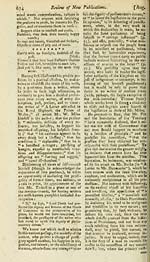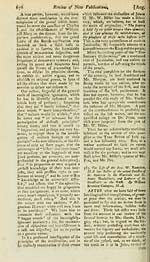Download files
Complete book:
Individual page:
Thumbnail gallery: Grid view | List view

1796.]
Review of New Puhlicattom,
('7S
ence of fuch defcft conftitutes the
ground of fuch reproach, the argu.
ment cannot apply. N«ture, or, which
is the fame thing. Providence, is there-
fore in this inftance the objeft of
our author's attack.. But liere, a; in
the cafe of Mr. Tickell, not the bright
genius, the capacious mind, the fuper-
eminent endowments, of his adverfary,
appear to excite the envy of our au-
thor, but the penfions with which his
maj:fly has been pleafed to reward the
exertions of Mr. Burke in the fervice
of his country.
Mr. VV. Miles's eulogy on his friend
La Fayette is natural enough ; as the
latter only realized in France the glo-
rious plans which the former had pro-
jefled ia Brabant. Bat, when he talks
of the " tranfcendent public virtue" of
this inventor of " the facred right of
infurrei^ion," he mufl be told that his
condu6V to his foverei^n in the hour of
adveiiity proves him to have had a
mind as narrow and unfeelirg as his
principles were falfe and dangerous.
The mention of Mr. Burke leads
our author into a kind of explanation
of his own fituation, and of the pen-
fions which, he tells us, have been
dearly and honourably earned, by ma-
ny vears creditable, faithful, and ac-
knowltdged fervices, in which his pri-
vate fortune was impaired to a greater
amount than his penfion would I'ell for at
Garrawav's. For this, however, we have
only his tpfe dixit, which ought to be
received with extreme cautijn. But,
notwithflandine the freedom eicercifed
by Mr. W. Miles on the i'uhjt&pi Mr.
Bujke's penfions, he formally protefis
againft the excrcife of a fimilar freedom
with refpeiSt to his own. Mr Burke,
he fays, "knows nothing of his quan-
tum meruit, and cannot, muft not, be
upon the inqucft." As the puHlick in
general are equally uninformed up-
on the fubjeft, all enquiry is by this
means puciuded. As the power of
granting penfions is exclufively veflcd
by the confticuiion, for wife and bene-
ficial purpofes, in the executive go-
vernment of the country ; as tlie power
which confers the gift mufl be compe-
tent to decide on the merits of the perfon
who receives it : and as, in the prefent
ftate of fociety throughout Europe, it
is necelfary occafionaUy to employ, ar.d
confeqiicntly to reward, unworthy ob-
jei^s ; we ihall not enter into any dif-
CulTian of this puint. But the b'^ld
i>«cvefaucn of Mr. W. Miles, that, his
private fortune having been impaired,
by the public fervices which he render-
ed, to a greater amount than the re-
ward he received, he has an indubita-
ble right to his penfions, impels us to
offer two remarks, or rather to put
two queflions. Does Mr. W. Milee
mean to affirm that he was employed
by Government, in any capacity, pre-
vious to his arrival in the Netherlands
in the ifionth of January lySj f Is he
prepared to fay that his private fortune
was not impaired previous to that pe-
riod ? The nature of his fervices may,
perhaps, be inferred from the advice
which he gave during the revolt in the
Netherlands, and from his prefence in
the Jacobin club, at Paris, in 1791.
One of his penfions, our author fays,
he receives under the fign manual.
What then muft we think of the gra-
titude of the man, who, in the publica-
tion which we have before noticed,
could tranfgrefs the bounds of decency
and truth, in order to fix upon his fo-
vereign and his benefaftor a calum-
nious imputation of a breach of his
royal word, a violation of a folemn
promifcf Is this a proof of his love
'* of that juftice which is due to all,
and (hould be affured to all f" No; it
is— but the faft is fufficiently flrong to
difpenfe with a comment.
in bis " Preliminary Obfervations,"
as Mr. W. Miles i- pleafed to call
them, he adverts to th>: tranfarfions of
that eventful period, which terminated
in the abdication of the Siuarts, and
in the elevation of the Brunfwick fa-
mily to the throne of thcfc realms.
Any other mind would have been able
to defcry, in thefc momentous pro-
ceedings, fomething more than that a
king of England cannot be a tvrant
Vt-ith impunity.; and that the people
may find a remedy for all the evils of
defpoiLim in a revolution. A plain man
might, naturally enough, be led to
fuppnfe, that no extraordinary depth of
political (agacity, no mighty extent of
talent or forefight, was rtquilite for
the dilcovery of a truth, whic'h, in its
con'ined fenfe, that is, limited in its
ajiplication to the affairs ot this coun-
try, is fo nearly felf evident, that
Icarcely an individual in the kingdom
could be found to dillent from it ;
though the events which have marked
this remedial a;ra (if we may ufc fuch
an eicpreffion) in a neighbouring coun-
try, leem entirely to controvert the iali
part ef the propofition.
Review of New Puhlicattom,
('7S
ence of fuch defcft conftitutes the
ground of fuch reproach, the argu.
ment cannot apply. N«ture, or, which
is the fame thing. Providence, is there-
fore in this inftance the objeft of
our author's attack.. But liere, a; in
the cafe of Mr. Tickell, not the bright
genius, the capacious mind, the fuper-
eminent endowments, of his adverfary,
appear to excite the envy of our au-
thor, but the penfions with which his
maj:fly has been pleafed to reward the
exertions of Mr. Burke in the fervice
of his country.
Mr. VV. Miles's eulogy on his friend
La Fayette is natural enough ; as the
latter only realized in France the glo-
rious plans which the former had pro-
jefled ia Brabant. Bat, when he talks
of the " tranfcendent public virtue" of
this inventor of " the facred right of
infurrei^ion," he mufl be told that his
condu6V to his foverei^n in the hour of
adveiiity proves him to have had a
mind as narrow and unfeelirg as his
principles were falfe and dangerous.
The mention of Mr. Burke leads
our author into a kind of explanation
of his own fituation, and of the pen-
fions which, he tells us, have been
dearly and honourably earned, by ma-
ny vears creditable, faithful, and ac-
knowltdged fervices, in which his pri-
vate fortune was impaired to a greater
amount than his penfion would I'ell for at
Garrawav's. For this, however, we have
only his tpfe dixit, which ought to be
received with extreme cautijn. But,
notwithflandine the freedom eicercifed
by Mr. W. Miles on the i'uhjt&pi Mr.
Bujke's penfions, he formally protefis
againft the excrcife of a fimilar freedom
with refpeiSt to his own. Mr Burke,
he fays, "knows nothing of his quan-
tum meruit, and cannot, muft not, be
upon the inqucft." As the puHlick in
general are equally uninformed up-
on the fubjeft, all enquiry is by this
means puciuded. As the power of
granting penfions is exclufively veflcd
by the confticuiion, for wife and bene-
ficial purpofes, in the executive go-
vernment of the country ; as tlie power
which confers the gift mufl be compe-
tent to decide on the merits of the perfon
who receives it : and as, in the prefent
ftate of fociety throughout Europe, it
is necelfary occafionaUy to employ, ar.d
confeqiicntly to reward, unworthy ob-
jei^s ; we ihall not enter into any dif-
CulTian of this puint. But the b'^ld
i>«cvefaucn of Mr. W. Miles, that, his
private fortune having been impaired,
by the public fervices which he render-
ed, to a greater amount than the re-
ward he received, he has an indubita-
ble right to his penfions, impels us to
offer two remarks, or rather to put
two queflions. Does Mr. W. Milee
mean to affirm that he was employed
by Government, in any capacity, pre-
vious to his arrival in the Netherlands
in the ifionth of January lySj f Is he
prepared to fay that his private fortune
was not impaired previous to that pe-
riod ? The nature of his fervices may,
perhaps, be inferred from the advice
which he gave during the revolt in the
Netherlands, and from his prefence in
the Jacobin club, at Paris, in 1791.
One of his penfions, our author fays,
he receives under the fign manual.
What then muft we think of the gra-
titude of the man, who, in the publica-
tion which we have before noticed,
could tranfgrefs the bounds of decency
and truth, in order to fix upon his fo-
vereign and his benefaftor a calum-
nious imputation of a breach of his
royal word, a violation of a folemn
promifcf Is this a proof of his love
'* of that juftice which is due to all,
and (hould be affured to all f" No; it
is— but the faft is fufficiently flrong to
difpenfe with a comment.
in bis " Preliminary Obfervations,"
as Mr. W. Miles i- pleafed to call
them, he adverts to th>: tranfarfions of
that eventful period, which terminated
in the abdication of the Siuarts, and
in the elevation of the Brunfwick fa-
mily to the throne of thcfc realms.
Any other mind would have been able
to defcry, in thefc momentous pro-
ceedings, fomething more than that a
king of England cannot be a tvrant
Vt-ith impunity.; and that the people
may find a remedy for all the evils of
defpoiLim in a revolution. A plain man
might, naturally enough, be led to
fuppnfe, that no extraordinary depth of
political (agacity, no mighty extent of
talent or forefight, was rtquilite for
the dilcovery of a truth, whic'h, in its
con'ined fenfe, that is, limited in its
ajiplication to the affairs ot this coun-
try, is fo nearly felf evident, that
Icarcely an individual in the kingdom
could be found to dillent from it ;
though the events which have marked
this remedial a;ra (if we may ufc fuch
an eicpreffion) in a neighbouring coun-
try, leem entirely to controvert the iali
part ef the propofition.
Set display mode to: Large image | Transcription
Images and transcriptions on this page, including medium image downloads, may be used under the Creative Commons Attribution 4.0 International Licence unless otherwise stated. ![]()
| Early Gaelic Book Collections > Ossian Collection > Gentleman's magazine, and historical chronicle > Volume 66, Part 2 > (151) |
|---|
| Permanent URL | https://digital.nls.uk/79423583 |
|---|
| Description | Selected books from the Ossian Collection of 327 volumes, originally assembled by J. Norman Methven of Perth. Different editions and translations of James MacPherson's epic poem 'Ossian', some with a map of the 'Kingdom of Connor'. Also secondary material relating to Ossianic poetry and the Ossian controversy. |
|---|
| Description | Selected items from five 'Special and Named Printed Collections'. Includes books in Gaelic and other Celtic languages, works about the Gaels, their languages, literature, culture and history. |
|---|

